情态动词用法大全
(完整版)情态动词详细用法归纳
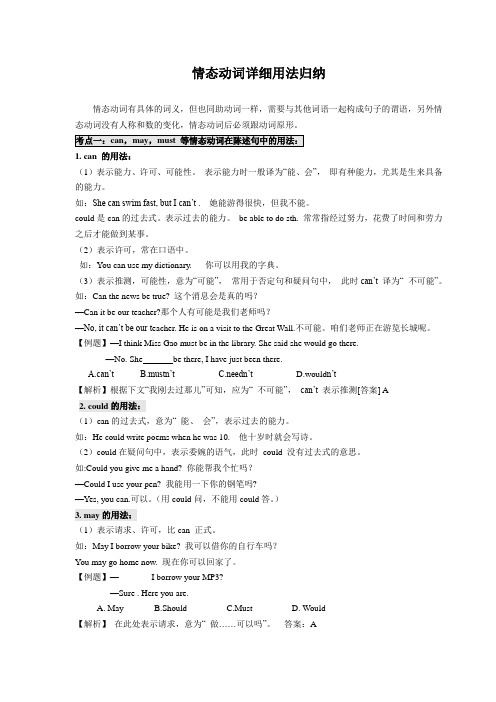
情态动词详细用法归纳情态动词有具体的词义,但也同助动词一样,需要与其他词语一起构成句子的谓语,另外情态动词没有人称和数的变化,情态动词后必须跟动词原形。
1. can 的用法:(1)表示能力、许可、可能性。
表示能力时一般译为“能、会”,即有种能力,尤其是生来具备的能力。
如:She can swim fast, but I can’t . 她能游得很快,但我不能。
could是can的过去式。
表示过去的能力。
be able to do sth. 常常指经过努力,花费了时间和劳力之后才能做到某事。
(2)表示许可,常在口语中。
如:You can use my dictionary. 你可以用我的字典。
(3)表示推测,可能性,意为“可能”,常用于否定句和疑问句中,此时can’t 译为“ 不可能”。
如:Can the news be true? 这个消息会是真的吗?—Can it be our teacher?那个人有可能是我们老师吗?—No, it can’t be our t eacher. He is on a visit to the Great Wall.不可能。
咱们老师正在游览长城呢。
【例题】—I think Miss Gao must be in the library. She said she would go there.—No. She be there, I have just been there.A.can’tB.mustn’tC.needn’tD.would n’t【解析】根据下文“我刚去过那儿”可知,应为“ 不可能”,can’t 表示推测[答案] A2. could的用法:(1)can的过去式,意为“ 能、会”,表示过去的能力。
如:He could write poems when he was 10. 他十岁时就会写诗。
(2)could在疑问句中,表示委婉的语气,此时could 没有过去式的意思。
14个情态动词及其用法

14个情态动词及其用法14个情态动词及其用法如下:1.can:表示能力,用于疑问句或否定句中表示惊异、怀疑、不相信等态度。
如:Can you speak English?你会说英语吗?2.could:表示过去的能力或可能性。
表示惊异、怀疑、不相信等态度时,可用could。
如:Could you have done this?你真的能做到这个吗?3.may:表示可能性。
用于请求、允许、祝愿等场合。
如:May I borr ow your book?我能借你的书吗?4.might:表示可能性,比may更委婉。
如:Might I have your attenti on,请大家注意。
5.must:表示肯定、确定,用于陈述事实或推测。
如:The game must be over,比赛应该结束了。
6.need:表示需要、必要性。
如:We need to finish this task today。
我们今天需要完成这个任务。
7.ought to:表示应该、应当,用于表示道义上的责任或推测。
如:Yo u ought to help him,你应当帮助他。
8.dare:表示勇气、敢。
如:Dare you jump off the bridge?你敢从桥上跳下去吗?9.shall:表示询问、承诺、威胁等。
如:Shall we start?我们开始吗?10.will:表示将来、意愿、决心等。
如:I will finish this work on ti me.我会按时完成这个工作。
11.had better:表示建议、警告。
如:You had better hurry,你最好快点。
12.have to:表示被迫、必须。
如:I have to go to work,我必须去上班。
ed to:表示过去经常发生的动作或状态,也可表示习惯或倾向。
如:He used to smoke,他过去经常抽烟。
14.shouldn't:表示不应该,用于否定句中表示建议、批评等。
情态动词用法归纳(全)
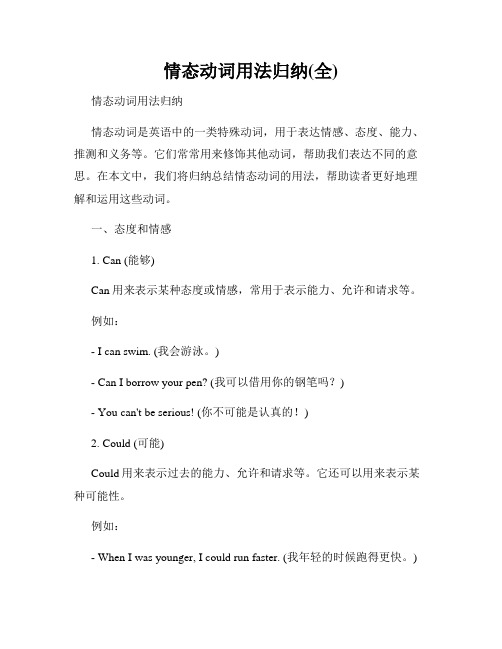
情态动词用法归纳(全)情态动词用法归纳情态动词是英语中的一类特殊动词,用于表达情感、态度、能力、推测和义务等。
它们常常用来修饰其他动词,帮助我们表达不同的意思。
在本文中,我们将归纳总结情态动词的用法,帮助读者更好地理解和运用这些动词。
一、态度和情感1. Can (能够)Can用来表示某种态度或情感,常用于表示能力、允许和请求等。
例如:- I can swim. (我会游泳。
)- Can I borrow your pen? (我可以借用你的钢笔吗?)- You can't be serious! (你不可能是认真的!)2. Could (可能)Could用来表示过去的能力、允许和请求等。
它还可以用来表示某种可能性。
例如:- When I was younger, I could run faster. (我年轻的时候跑得更快。
)- Could I ask you a question? (我可以问你一个问题吗?)- It could rain later, so bring an umbrella. (今天后面可能会下雨,所以带上雨伞。
)3. May (可能)May常表示许可、请求和推测等。
它还可以用来表示某种可能性或希望。
例如:- May I use your phone? (我可以用一下你的手机吗?)- It may rain tomorrow. (明天可能会下雨。
)- They may arrive late. (他们可能会迟到。
)4. Might (可能)Might与may的用法类似,但表示的可能性稍微低一些。
例如:- She might be busy. (她可能很忙。
)- I might go to the party, but I'm not sure yet. (我可能会去参加派对,但我还不确定。
)二、能力和推测1. Must (必须)Must用来表示强烈的推断或必要性。
情态动词主要用法总结
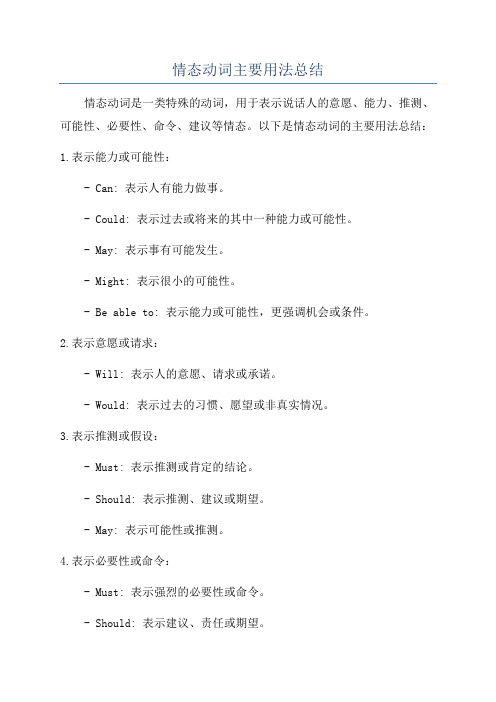
情态动词主要用法总结
情态动词是一类特殊的动词,用于表示说话人的意愿、能力、推测、可能性、必要性、命令、建议等情态。
以下是情态动词的主要用法总结:1.表示能力或可能性:
- Can: 表示人有能力做事。
- Could: 表示过去或将来的其中一种能力或可能性。
- May: 表示事有可能发生。
- Might: 表示很小的可能性。
- Be able to: 表示能力或可能性,更强调机会或条件。
2.表示意愿或请求:
- Will: 表示人的意愿、请求或承诺。
- Would: 表示过去的习惯、愿望或非真实情况。
3.表示推测或假设:
- Must: 表示推测或肯定的结论。
- Should: 表示推测、建议或期望。
- May: 表示可能性或推测。
4.表示必要性或命令:
- Must: 表示强烈的必要性或命令。
- Should: 表示建议、责任或期望。
- Have to: 表示客观上的必要性。
5.表示允许或禁止:
- Can: 表示人被允许做事。
- May: 表示人有许可或请求。
- Must not: 表示禁止做事。
6.表示习惯、忠告或规定:
- Should: 表示习惯、忠告或规定。
- Ought to: 表示强烈的建议或道义上的责任。
情态动词的用法具有一定的灵活性,其意义和用法还会受上下文的影响。
特别是在否定和疑问句中,情态动词的用法和意义可能会有所变化。
因此,对于情态动词的深入理解需要通过大量的阅读和实践来逐渐掌握。
情态动词的用法大全

情态动词的用法大全特征1)情态动词(modal verb)本身有词义,表示说话人的语气或情态,但词义不完全,不能单独用作谓语动词,一般只能和动词原形一起构成谓语动词。
2)情态动词所表示的情态有:命令、允诺、请求、拒绝、愿望、愿意、义务、必要、可能、能力、敢于、需要等。
3)情态动词(ought除外)和助动词shall,will,should,would一样,后面的动词不定式一般皆不带。
形式变化1)没有人称和数的变化,第三人称单数的现在时也无变化。
如:I can We canYou can You canHeThey canShe canIt2)有些情态动词有过去式,有少数过去式和它的原形相同。
a)有过去式的情态动词有:may -- wouldcan ―― couldmay―― nightshall -- shouldhave to -- had tob)过去式不变的情态动词有:must - must (或had to)ought to - ought toneed---needdare - dare(亦可用dared)3)大多数情态动词后面可用动词的进行式、完成式和被动形式,如:can(may,must)be doing,can(may,must) have done,can(may,must)be done等。
否定式情态动词和助动词一样,后面可直接跟否定词not。
现将情态动词的否定式及其否定式的简略式(简略式用于口语中)列举如下:shall not--shan't [FB:nt]will not---won't [wEunt]can not-can't [kB:nt]must not-mustn't [5mQsnt]should not-- shouldn'twould not-- wouldn'tcould not-- couldn'tdare not- daren't [dZEnt]need not-- needn't在疑问句中的用法情态动词在疑问句中的用法和助动词相同。
(完整版)初中英语情态动词用法大全

情态动词用法归纳情态动词有can (could), may (might), must, have to, shall (should, will (would), dare (dared), need (needed), ought to等。
情态动词无人称和数的变化;不能单独使用,必须与其后的动词原形构成谓语一、can, could1) 表示能力(体力、知识、技能)。
Can you lift this heavy box?(体力)Mry can speak three languages.(知识)Can you skate?(技能)此时可用be able to代替。
Can只有一般现在时和一般过去式;而be able to则有更多的时态。
I’ll not be able to come this afternoon.当表示“经过努力才得以做成功某事”时应用be able to,不能用Can。
如:He was able to go to the party yesterday evening in spite of the heavy rain.2) 表示请求和允许。
-----Can I go now?----- Yes, you can. / No, you can’t.此时可与may互换。
在疑问句中还可用could,might代替,不是过去式,只是语气更委婉,不能用于肯定句和答语中。
---- Could I come to see you tomorrow?---- Yes, you can. ( No, I’m afraid not. )3) 表示客观可能性(客观原因形成的能力)。
They’ve changed the time table, so we can go by bus instead.This hall can hold 500 people at least.4) 表示推测(惊讶、怀疑、不相信的态度),用于疑问句、否定句和感叹句中。
情态动词的用法完整详细

情态动词的用法完整详细情态动词定义:情态动词是一种本身有一定的词义,但要与动词原形一起使用,给谓语动词增添情态颜色,表示说话人对有关行为或事物的态度和看法,认为其可能、应当或须要等。
情态动词后面加动词原形。
分类:情态动词有四类:①只做情态动词:must,can(could),may(might),ought to①可做情态动词又可做实义动词:need,dare①可做情态动词又可做助动词:shall(should),will(would)①具有情态动词特征:have(had) to,used to位置:情态动词在句中放在谓语动词之前, 谓语动词前若有助动词,则在助动词之前,疑问句中, 情态动词则在主语之前。
I can see you. Come here.我能看见你,过来吧。
He must have been away.他一定走了。
What can I do for you?我能帮你吗?How dare you treat us like that!你怎能那样对待我们!特点:情态动词无人称和数的变化, 情态动词后面跟的动词需用原形,否定式构成是在情态动词后面加"not"。
个别情态动词有现在式和过去式两种形式, 过去式用来表达越发客气, 委婉的语气, 时态性不强, 可用于过去,现在或未来。
情态动词属非及物动词,故没有被动语态。
情态动词没有非谓语形式,即没有不定式,分词,等形式。
He could be here soon.他很快就来。
We can't carry the heavy box.我们搬不动那箱子。
I'm sorry I can't help you.对不起,我帮不上你。
基本助动词与情态助动词最主要的区分之一是,基本助动词本身没有词义,而情态助动词则有自己的词义,能表示说话人对有关动作或状态的看法,或表示主观设想:What have you been doing since? (构成完成举行体,本身无词义)I am afraid I must be going. (一定要)You may have read some account of the matter. (或许已经)除此之外,情态助动词还有如下词法和句法特征:1)除ought和used以外,其他情态动词后面只能接不带to的不定式。
情态动词用法大全
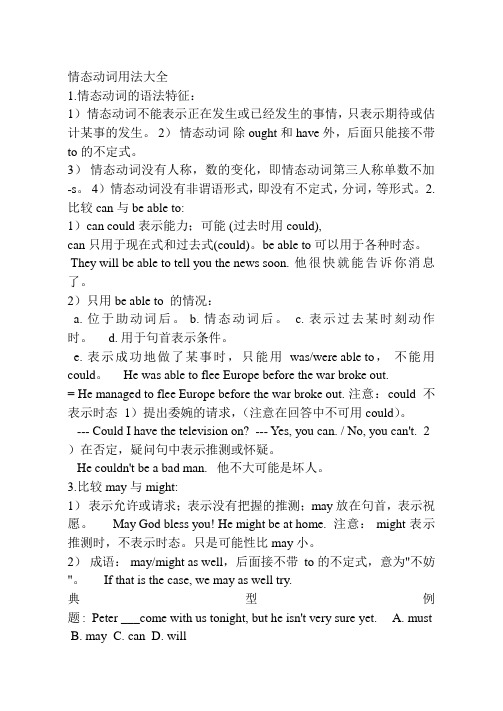
情态动词用法大全1.情态动词的语法特征:1)情态动词不能表示正在发生或已经发生的事情,只表示期待或估计某事的发生。
2)情态动词除ought 和have 外,后面只能接不带to 的不定式。
3)情态动词没有人称,数的变化,即情态动词第三人称单数不加-s。
4)情态动词没有非谓语形式,即没有不定式,分词,等形式。
2.比较can与be able to:1)can could 表示能力;可能 (过去时用could),can只用于现在式和过去式(could)。
be able to可以用于各种时态。
They will be able to tell you the news soon. 他很快就能告诉你消息了。
2)只用be able to 的情况:a. 位于助动词后。
b. 情态动词后。
c. 表示过去某时刻动作时。
d. 用于句首表示条件。
e. 表示成功地做了某事时,只能用was/were able to,不能用could。
He was able to flee Europe before the war broke out.= He managed to flee Europe before the war broke out. 注意:could不表示时态 1)提出委婉的请求,(注意在回答中不可用could)。
--- Could I have the television on? --- Yes, you can. / No, you can't. 2)在否定,疑问句中表示推测或怀疑。
He couldn't be a bad man. 他不大可能是坏人。
3.比较may与might:1)表示允许或请求;表示没有把握的推测;may 放在句首,表示祝愿。
May God bless you! He might be at home. 注意: might 表示推测时,不表示时态。
只是可能性比may 小。
最全情态动词的用法
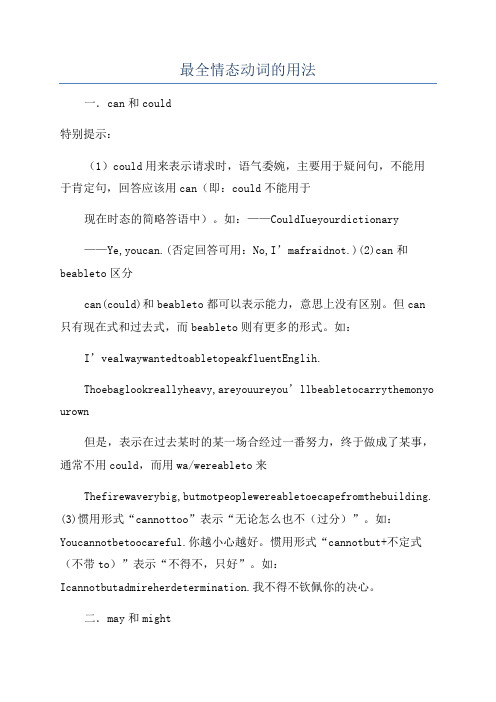
最全情态动词的用法一.can和could特别提示:(1)could用来表示请求时,语气委婉,主要用于疑问句,不能用于肯定句,回答应该用can(即:could不能用于现在时态的简略答语中)。
如:——CouldIueyourdictionary——Ye,youcan.(否定回答可用:No,I’mafraidnot.)(2)can和beableto区分can(could)和beableto都可以表示能力,意思上没有区别。
但can 只有现在式和过去式,而beableto则有更多的形式。
如:I’vealwaywantedtoabletopeakfluentEnglih.Thoebaglookreallyheavy,areyouureyou’llbeabletocarrythemonyo urown但是,表示在过去某时的某一场合经过一番努力,终于做成了某事,通常不用could,而用wa/wereableto来Thefirewaverybig,butmotpeoplewereabletoecapefromthebuilding.(3)惯用形式“cannottoo”表示“无论怎么也不(过分)”。
如:Youcannotbetoocareful.你越小心越好。
惯用形式“cannotbut+不定式(不带to)”表示“不得不,只好”。
如:Icannotbutadmireherdetermination.我不得不钦佩你的决心。
二.may和might二.mut和haveto四.hall和hould五.will和would特别提示:would与uedto辨析Inthoeday,wheneverIhaddifficultie,IwouldgotoMr.Chenforhelp.六.need和dare七.ought的用法:说明:hould与oughtto表示“应该”时的区别hould表示自己的主观看法,而oughtto的语气中,含有“按道理应该”之意。
情态动词的用法归纳
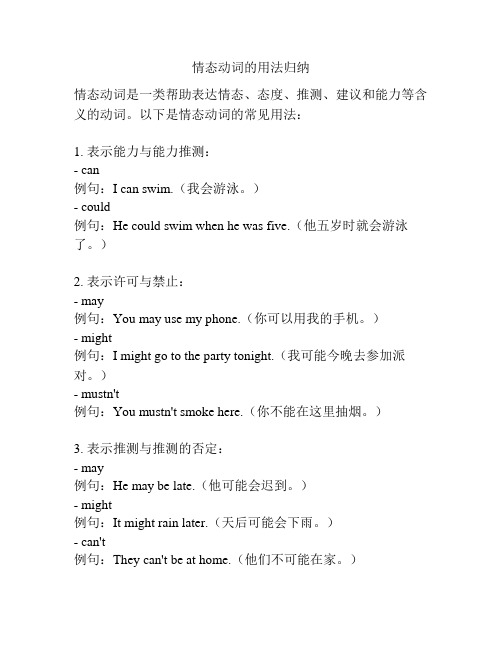
情态动词的用法归纳情态动词是一类帮助表达情态、态度、推测、建议和能力等含义的动词。
以下是情态动词的常见用法:1. 表示能力与能力推测:- can例句:I can swim.(我会游泳。
)- could例句:He could swim when he was five.(他五岁时就会游泳了。
)2. 表示许可与禁止:- may例句:You may use my phone.(你可以用我的手机。
)- might例句:I might go to the party tonight.(我可能今晚去参加派对。
)- mustn't例句:You mustn't smoke here.(你不能在这里抽烟。
)3. 表示推测与推测的否定:- may例句:He may be late.(他可能会迟到。
)- might例句:It might rain later.(天后可能会下雨。
)- can't例句:They can't be at home.(他们不可能在家。
)4. 表示义务与责任:- must例句:We must finish our homework.(我们必须完成作业。
)- have to例句:I have to go to work early tomorrow.(我明天必须早点去上班。
)5. 表示愿望与建议:- should例句:You should exercise regularly.(你应该经常锻炼。
)- ought to例句:They ought to help others.(他们应该帮助别人。
)6. 表示推荐与要求:- would like例句:I would like to have a cup of tea.(我想要一杯茶。
)- need例句:You need to finish this report by tomorrow.(你需要在明天之前完成这份报告。
情态动词的用法
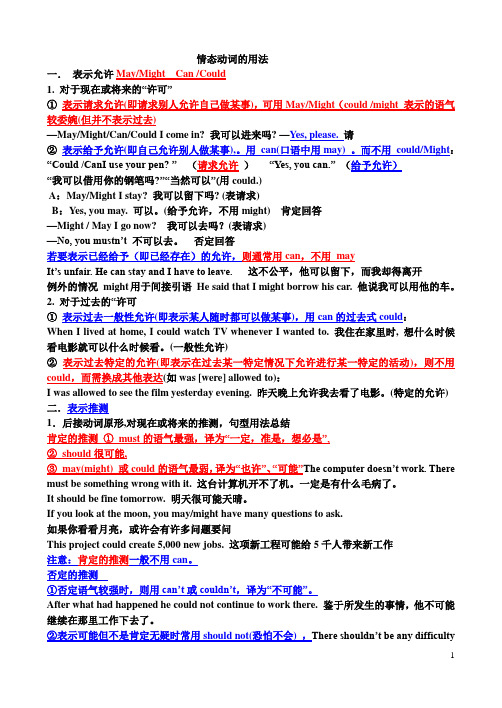
He must have taken the book since it isn’t here.他一定是把书拿走了,因为书已不在这里了。
What could have become of him now?现在他可能怎么样了呢?
You may have noted that my address has changed.你也许已经注意到我的地址变了。
I ought to have helped her,but I never could.我本该帮助她的,却从未能这样做。
You should not have left so soon.你本不该那么早就走的。
You shouldn’t have told him about it.你本不该把这件事告诉他的。
4.should+ have + P. P.本来应该做某事(而实际上没做)
5.need + have done(用于否定句或疑问句)用于否定时意为“本来不必做某事(而实际上做了)”,用于疑问句时意为“有必要……吗”。
注意:其中could, might不可用can, may代替,这与表示推测时的用法不同。
②表示给予允许(即自己允许别人做某事),。用can(口语中用may)。而不用could/Might:
“Could /CanI use your pen? ”(请求允许)“Yes, you can.”(给予允许)
“我可以借用你的钢笔吗?”“当然可以”(用could.)
A:May/Might I stay?我可以留下吗? (表请求)
It should be fine tomorrow.明天很可能天晴。
情态动词的用法归纳终极版
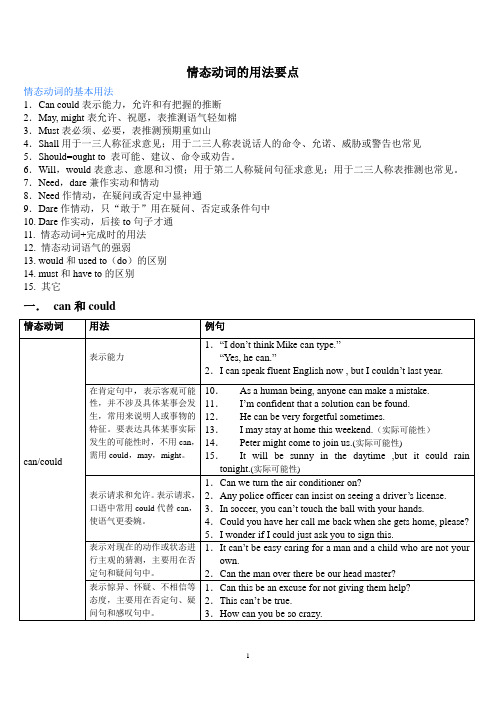
情态动词的用法要点情态动词的基本用法1.Can could表示能力,允许和有把握的推断2.May, might表允许、祝愿,表推测语气轻如棉3.Must表必须、必要,表推测预期重如山4.Shall用于一三人称征求意见;用于二三人称表说话人的命令、允诺、威胁或警告也常见5.Should=ought to 表可能、建议、命令或劝告。
6.Will,would表意志、意愿和习惯;用于第二人称疑问句征求意见;用于二三人称表推测也常见。
7.Need,dare兼作实动和情动8.Need作情动,在疑问或否定中显神通9.Dare作情动,只“敢于”用在疑问、否定或条件句中10. Dare作实动,后接to句子才通11. 情态动词+完成时的用法12. 情态动词语气的强弱13. would和used to(do)的区别14. must和have to的区别15. 其它一.can和could特别说明:(1)could用来表示请求时,语气委婉,主要用于疑问句,不能用于肯定句,答语应用can(即:could不能用于现在时态的简略答语中)。
如:——Could I use your dictionary?——Yes, you can.(否定回答可用:No, I’m afraid not.)(2)can和be able to辨析can(could)和be able to都可以表示能力,意思上没有区别。
但can只有现在式和过去式,而be able to则有更多的形式。
如:I’ve always wanted to able to speak fluent English.Those bags look really heavy, are you sure you’ll be able to carry them on your own?但是,表示在过去某时的某一场合经过一番努力,终于做成了某事,通常不用could,而用was/were able to来表示。
情态动词用法归纳总结
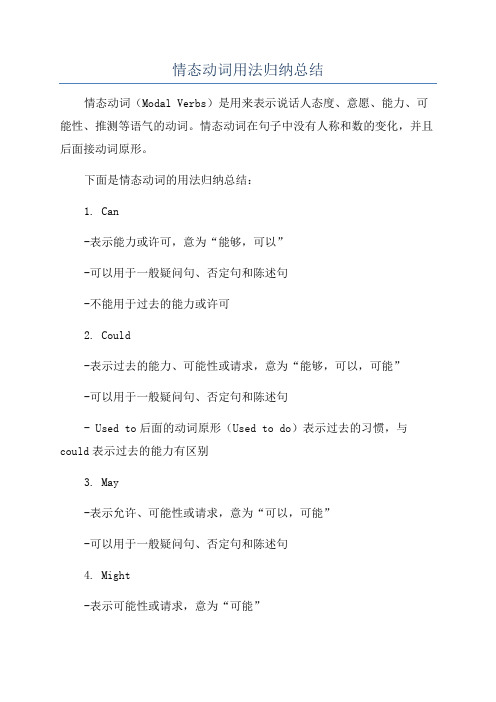
情态动词用法归纳总结情态动词(Modal Verbs)是用来表示说话人态度、意愿、能力、可能性、推测等语气的动词。
情态动词在句子中没有人称和数的变化,并且后面接动词原形。
下面是情态动词的用法归纳总结:1. Can-表示能力或许可,意为“能够,可以”-可以用于一般疑问句、否定句和陈述句-不能用于过去的能力或许可2. Could-表示过去的能力、可能性或请求,意为“能够,可以,可能”-可以用于一般疑问句、否定句和陈述句- Used to后面的动词原形(Used to do)表示过去的习惯,与could表示过去的能力有区别3. May-表示允许、可能性或请求,意为“可以,可能”-可以用于一般疑问句、否定句和陈述句4. Might-表示可能性或请求,意为“可能”-可以用于一般疑问句、否定句和陈述句5. Must-表示必须、推测或强烈的可能性,意为“必须,一定”-可以用于一般疑问句、否定句和陈述句6. Shall-表示将来的意愿或决定,意为“将,会”- 一般只用于第一人称(I和we)-可以用于一般疑问句、否定句和陈述句7. Should-表示应该、可能性或建议,意为“应该”-可以用于一般疑问句、否定句和陈述句8. Will-表示将来的意愿或决定,意为“将,会”-可以用于一般疑问句、否定句和陈述句9. Would-表示过去的习惯、虚拟语气或请求,意为“将,会,愿意”-可以用于一般疑问句、否定句和陈述句-用于主动语态时表示客气的请求或意愿,用于被动语态时表示过去的习惯10. ought to-表示应该,意为“应该”-用于一般疑问句、否定句和陈述句需要注意的是,情态动词后面的动词一般是不带to的原形形式。
有些情态动词的意思可能会根据上下文有所变化,所以具体使用时还需根据具体情况来判断。
情态动词的用法总结
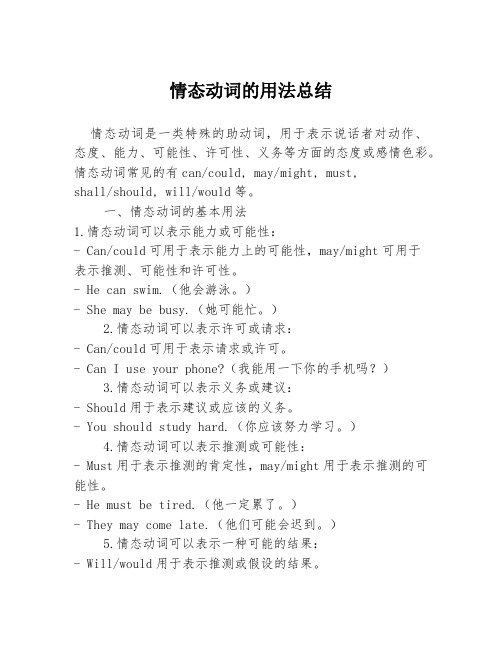
情态动词的用法总结情态动词是一类特殊的助动词,用于表示说话者对动作、态度、能力、可能性、许可性、义务等方面的态度或感情色彩。
情态动词常见的有can/could, may/might, must,shall/should, will/would等。
一、情态动词的基本用法1.情态动词可以表示能力或可能性:- Can/could可用于表示能力上的可能性,may/might可用于表示推测、可能性和许可性。
- He can swim.(他会游泳。
)- She may be busy.(她可能忙。
)2.情态动词可以表示许可或请求:- Can/could可用于表示请求或许可。
- Can I use your phone?(我能用一下你的手机吗?)3.情态动词可以表示义务或建议:- Should用于表示建议或应该的义务。
- You should study hard.(你应该努力学习。
)4.情态动词可以表示推测或可能性:- Must用于表示推测的肯定性,may/might用于表示推测的可能性。
- He must be tired.(他一定累了。
)- They may come late.(他们可能会迟到。
)5.情态动词可以表示一种可能的结果:- Will/would用于表示推测或假设的结果。
- If it rains, we will stay indoors.(如果下雨了,我们就呆在室内。
)二、情态动词的注意事项1.情态动词没有人称和数的变化,后面直接跟动词原形。
- He can play the piano.(他会弹钢琴。
)2.情态动词后面的动词一般用原形,表示动作和状态。
- I can swim.(我会游泳。
)- They should apologize.(他们应该道歉。
)3.情态动词用于疑问句时,直接将情态动词置于句首。
- Can you swim?(你会游泳吗?)4.情态动词用于否定句时,直接在情态动词前加"not"。
情态动词用法归纳(全)

例 --- I think Miss Gao must be in the library. She said she would go there.
情态动词用法归纳
情态动词无人称和数的变化;不能单独 使用,必须与其后的动词原形构成谓语
一、 can, could
1) 表示能力(体力、知识、技能)。 Can you lift this heavy box?(体力) Mary can speak three languages.(知识) Can you skate?(技能) 此时可用be able to代替。 Can只有一般现在时和一般过去式;而be able to则有
四、 dare, need
3) dare和 need作实义动词用时, 有人称、时态和数的变化。 在肯定句中,dare后面常接带to的不定式。在疑问句和否 定句中,dare后面可接带to或不带to的不定式。而need后 面只能接带to的不定式。
1. I dare to swim across this river.
2) 表示劝告、建议和命令。should, ought to可通用,但在疑 问句中常用should。
1. You should / ought to go to class right away.
2. Should I open the window?
3) 表示推测
七、should, ought to
考点一 can ,may, must 等情态动词在陈述句中的用法
初中英语十大情态动词用法

初中英语十大情态动词用法十大情态动词1. can⑴表示能力,一样译为“能、会”,专门指生来具备的能力。
She can swim fast, but I can’t . 她会游泳,但我可不能。
⑵表示许可,常在口语中。
You can use my dictionary. 你能够使用我的词典。
⑶表示估量,意为“可能”,常用于否定句和疑问句中,现在can’t 译为“不可能”。
Can the news be true? 那个消息可能是确实吗?It can’t be our teacher. He is on a visit to the Great Wall.不可能是老师。
他正在参观长城呢。
2. could⑴can的过去式,意为“能、会”,表示过去的能力。
He could write poems when he was 10. 他十岁的时候就会写诗。
⑵could在疑问句中,表示委婉要求的语气,现在could没有过去式的意思。
Could you do me a favor? 你能够帮我一个忙吗?—Could I use your pen? 我能够使用你的钢笔吗?—Yes, you can.(注意回答)能够。
3. may⑴表示要求、许可,比can正式,May I borrow your bike? 我能够借用你的自行车吗?You may go home now. 你现在能够回家了。
⑵表示估量,谈论可能性,意为“可能,或许”,一样用于确信句中。
It may rain tomorrow . 改日可能会下雨。
⑶may的过去式为might。
might 也表示可能性低于may(现在migh t没有过去式的意思)。
He is away from school. He might be sick. 他离开学校了。
也许是病了。
⑷表示期望、祈求、祝愿,常可译为“祝愿”。
通常是用may +主+VMay you have a good time!祝你玩的愉快!May you be happy! 祝你欢乐!4. must⑴must 表示主观看法,意为“必须”。
情态动词用法大全

2 May/ might
---May I come in ?
---Yes, please.
1 表示请求、允许;比can正式:答 语避免使用may,以免显得太严 肃或太不客气.might比may 的 语气更委婉。
Be able to
Can 表示一贯的能力,be able to 表示通过努力成功做到某事 的能力。另外,因为can不能和 其他助动词连用,所以表示将来 时用will be able to
I can’t skate. But I am sure I will be able to skate through more practice.
A. mustn’t leave
B. shouldn’t have left
C. couldn’t have left
D. needn’t leave
4) I told Sally how to get here, but perhaps I _____ for her. (NMET’04)
A. had to write it out B. must have written it out C. should have written it out D. ought to write it out
should not have done / ought not to have done:表 示过去本不应该做某事但事 实上却做了。
• need not have done:表示过去 本来没有必要做某事,但事实上 却做了。
3) I was really anxious about you. You ____ home without a word. (NMET2001)
情态动词用法大全:表达不同含义和语气

情态动词用法大全:表达不同含义和语气情态动词在英语语法中的使用非常广泛,它们可以表达不同的含义和语气。
下面是一些常见的情态动词及其用法:1.肯定推测2.情态动词"may"和"might"可以用来表示肯定推测,表示有可能发生某件事情。
例如:3."He may be at home now."4."It might rain tomorrow."5.疑问推测6.情态动词"can"和"could"可以用来表示疑问推测,表示对某件事情的质疑或不确定。
例如:7."Can he finish the project on time?"8."I don't know how he could do it."9.否定推测10.情态动词"can't"和"couldn't"可以用来表示否定推测,表示对某件事情的否定或排除。
例如:11."She can't be more than 20 years old."12."It couldn't have been the same person."13.虚拟语气14.情态动词"should", "would", "might", "could"等可以与虚拟语气连用,表示与实际情况相反的情况或假设的情况。
例如:15."If I should win the lottery, I would buy a new car."16."If I had known the answer, I would have told you."17.礼貌请求18.情态动词"could", "would", "might"等可以用来表示礼貌请求,表示请求对方做某件事情的意愿或可能性。
- 1、下载文档前请自行甄别文档内容的完整性,平台不提供额外的编辑、内容补充、找答案等附加服务。
- 2、"仅部分预览"的文档,不可在线预览部分如存在完整性等问题,可反馈申请退款(可完整预览的文档不适用该条件!)。
- 3、如文档侵犯您的权益,请联系客服反馈,我们会尽快为您处理(人工客服工作时间:9:00-18:30)。
The girl can dance very well. I could swim across the river when I was young. 1 表示能力
---Can I go now?
---yes, you can. 2 表示请求和允许,多用于否定
与疑问结构中。表示请求,口语 中常用could代替can.
The fire spread through the hotel, but everyone was able to get out.
2 May/ might
---May I come in ?
---Yes, please.
1 表示请求、允许;比can正式:答 语避免使用may,以免显得太严 肃或太不客气.might比may 的 语气更委婉。
• What shall we do now?我们现 在该怎么办?
• Shall I write it down?要我记下 来吗?
• Shall he come in?要他进来吗
• 1 用于第一,三人称的疑问句中, 表示说话人征求对方意见和向对 方请示。
You shall have it back tomorrow.
You must come to school on time.
1 表示“必须;应该”着重说话 人的主观看法。
• It must be our headteacher.
• 2 表示有把握的推测,只用于肯 定句。
• I have to go now
• 表示“必须;不得不” 强调客 观需要
• 5 Shall
It may be a trick.
He might have some fever.
He may not come today.
It can’t be our headmaster.
2 表示推测,意为“许可,可 能”might比may可能性更小。 注意:表推测时, may not 意为 “可能不”。 Can not意为“不 可能”
• I should advise you not to do that.
• 我建议你不要那样做。
• 3 用于第一人称,表示说话人的 一种谦逊,客气,委婉的语气。
7 Need
You needn’t ask me the question.
Need I finish work before ten?
作“总是,惯于”
• It would be about ten when he left home.
• 他离开家时可能大约十点钟了。 • 4 表示预料或猜想。
No matter what I said, he wouldn’t listen to me
5 用于否定句, 表示“不肯;不 乐意”
4 Must
你明天可以将它拿回。
All the dishes shall be cleaned at once.
所有的盘子都要马上洗干净。
2 用于二,三人称的陈述句中, 表示说话人给对方的命令,警告, 允诺或威胁等。
—I promise her daughter ____ get a nice present on her birthday. —Will it be a big surprise to her? A. should B. must C. would D. shall
Be able to
Can 表示一贯的能力,be able to 表示通过努力成功做到某事 的能力。另外,因为can不能和 其他助动词连用,所以表示将来 时用will be able to
I can’t skate. But I am sure I will be able to skate through more practice.
• 2 表示“请求;建议” 用would 比will 委婉,客气些。
• Fish will die without water. • 鱼离开水就会死。
• He would come to see me when he was in Beijing .
• 他在北京时,常来看望我。 • 3 表示经常性,习惯性动作。译
• You ought to go to see the doctor
• 表示“应该”
He ought to be home by now. 表示“推测”
10 Used to
He used to smoke a lot. 表示过去常常(暗含现在已经不
Could you lend me some money?
In winter the winds can be very cold. Anybody can make mistakes. 3 表示推测 (可能;可以;会)
How can you be so foolish!
4 表示惊讶,怀疑,不相信(主 要用于否定句,疑问句和惊叹句)
• May you succeed! • 祝你成功! • 3 May 用于祈使句表示祝愿。
• 3 Will /would
• I will never do that again. 1 用于表示意志或意思。Will指现
在,would指过去。
• Would/will you kindly tell me the way to the station?
shall表示”允诺”,根据讲话人 语气可以知道,选项部分表示讲 话是给对方的一种承诺,故应该 选情态动词shall用于第二或第三 人称用作主语的句子结构中。答 案D。
6 should
We should be strict with ourselves.
1 表示劝告或建议,做“应该” 讲。
• They should be back by now • 他们现在应该回来了吧。 • 2 表示“推测”
1 表示“需要,必要”用于否定 句,疑问句和条件从句中。
8 Dare
Dare you go out at night?
The boy daren’t say so before the teacher.
1 表示“敢,敢于”主要用于疑 问句,否定句和条件从句中,一 般不用于肯定句。
• 9 Ought to
